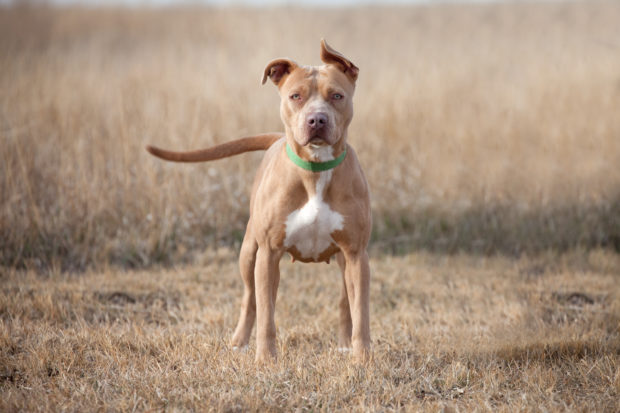There are flashpoints in our relationship with animals – controversies where people are divided on important topics, from vegetarianism to captive wildlife in zoos to deer management. But surely one of the most controversial issues is our relationship with pit bull type dogs. Are they inherently dangerous, or are they like any other dogs, but just victims of the wrong people being attracted to them? HSUS board chairman Rick Bernthal, former managing partner of the Washington office of the global law firm Latham & Watkins, is a pit bull enthusiast and activist. I asked him to review Bronwen Dickey’s new, bestselling book, Pit Bull: The Battle Over an American Icon, and Rick was only too happy to oblige. Dickey’s book is part of the enormous and growing body of serious-minded thinking and writing on animal issues. As Rick notes, she takes the discussion about these dogs to a whole new level, and I hope you’ll read his review.

The root cause of our view of pit bulls, Dickey argues, comes not from the animals themselves, but from our own ignorance, fear, and prejudice. Photo by iStockphoto
***
Like millions of other Americans, I’m an incorrigible dog lover. But as a society we are also strangely selective with our affections. Some breeds, like pit bulls, are irrationally and historically maligned, and Bronwen Dickey’s wonderful new book, Pit Bull: The Battle Over an American Icon, takes an in-depth look at the complicated social and cultural reasons why.
The public hysteria and misinformation about pit bulls is breathtaking in its scope, intensity, and inaccuracy. Thoughtful, intelligent people believe that these dogs have “powerful, locking jaws,” that they “turn” on their owners without warning, that they are somehow fundamentally different from, and far more dangerous than, other dogs. Many communities in the United States (including, notably, the cities of Miami and Denver) ban ownership of pit bulls altogether, despite the sheer absence of any statistical basis to justify treating them separately. (This “breed-specific legislation” is thankfully on the wane: the laws are expensive to enforce, grossly unfair to well-behaved dogs and law-abiding families, and utterly ineffective; they don’t reduce dog bites at all, anywhere.)
At long last, a scholar, historian, and journalist has invested the time and effort to chase down every canard and fear about pit bulls and set the record straight. In the process, she has placed the controversy over pit bulls in historic, social, and cultural context for us, so that we not only can learn the truth about these dogs, but also understand where all the misperceptions came from, and why they endure.
Pit Bull is a tour de force; the most comprehensive, thoughtful, and dispassionate treatment of this topic ever undertaken. Dickey has painstakingly interviewed pit bull lovers and haters, rescuers and abusers, breeders and buyers. She has combed history to enlighten us on the origins of these dogs and helped us see why we’ve had a need to vilify them, even when there is utterly no foundation for doing so. She demonstrates that much of our antipathy toward these dogs reflects our deep biases toward others of the human race who may not share our culture or social standing. The root cause of our view of pit bulls, Dickey argues, comes not from the animals themselves, but from our own ignorance, fear, and prejudice.
Pit bulls (like all dogs) make fabulous pets and loving family members, and their “cause” has been embraced by millions around the country. How to convince a doubting, fearing public? That only happens one dog, and one person, at a time.
At The HSUS, we work hard to educate the public about the realities of these misunderstood and maligned animals. Many other groups do, too. As Dickey writes about in the book, through our Pets for Life program, we are ensuring equal access to pet resources for all communities, including those most often connected with the negative stereotype of pit bulls. Dickey gives credit to The HSUS for focusing on closing the gap in animal welfare services that exists because of misconceptions and discrimination.
I grew up with boxers, that irrepressible, clownish, high-energy breed, and I had a boxer by my side (and on my bed) for decades thereafter. About 10 years ago, as my own interest in animal welfare began to broaden, I learned about the plight of the pit bull, and since then, my sons and I have welcomed six pitties into our family. We’ve rescued a dozen more. They are sweet, funny, fun-loving, loyal pooches – some are brilliant, others dumb as a box of rocks – wonderful with children, patient and forgiving, silly, cuddly, and bonded irrevocably to their human families. In other words, they are dogs.
Dickey’s book – a combination of exhaustive research, the presentation of impartial facts, the perceptive sense of social and political context and the addition of a rich and detailed historical framework – is an enormously valuable contribution to furthering this understanding.
For that, we are very much in Ms. Dickey’s debt.
The post Book review: Bronwen Dickey’s Pit Bull appeared first on A Humane Nation.
Enviroshop is maintained by dedicated NetSys Interactive Inc. owners & employees who generously contribute their time to maintenance & editing, web design, custom programming, & website hosting for Enviroshop.


